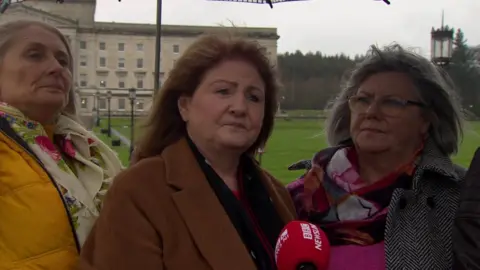Karen Bradley: NI secretary 'humbled' by Troubles families
Northern Ireland Secretary Karen Bradley has described a meeting with the families of some victims of the Troubles as "humbling".
On Friday she met relatives of people killed by security forces and apologised for controversial remarks she made about the Troubles this week.
She told MPs on Wednesday that deaths caused by security forces in Northern Ireland were "not crimes".
The sister of a man who was shot dead by the Army has called for her to quit.
Frances Meehan, whose brother Michael Donnelly was shot with a plastic bullet in 1981, said Mrs Bradley's position was "untenable".
She was one of the people who met Mrs Bradley on Friday, as part of a delegation from the victims' group Relatives for Justice.
'Hurt and suffering'
After the meetings, Mrs Bradley said she was "grateful" to the families for giving her the "opportunity to apologise personally for the offence and hurt" that her comments had caused.
"It was humbling to listen to each of them and their personal and deeply moving stories," she added.
"I heard about the hurt and suffering endured over many years, about the experiences of those whose family members died at the hands of the security forces.
"The families I met today referred to unarmed civilians and 82 children who lost their lives in incidents involving the security forces."

But Ms Meehan said the Northern Ireland's secretary apology was "not good enough for someone who is meant to represent the interests of Northern Ireland at the British cabinet".
"It is not acceptable that Karen Bradley remains in her post and we are calling again for her to resign," she added.
Her comments come after relatives of 10 people killed in west Belfast during the Troubles rejected an offer to meet the Northern Ireland secretary.
Those who died at Ballymurphy were shot dead shortly after the introduction of internment.
Internment was introduced in August 1971 against a backdrop of escalating violence and increased bombings in Northern Ireland. The new law gave the authorities the power to imprison people without trial.
An inquest into their deaths has been taking place in Belfast since November.
'Probably very angry'
In a statement late on Thursday night, the Ballymurphy victims' families said they had been requesting a meeting with Mrs Bradley since she became the Northern Ireland secretary in January last year.
"Karen Bradley hasn't even replied to these requests," they said.
 Pacemaker
PacemakerPádraig Ó'Muirigh, a solicitor for the families, said he had been instructed by his clients to contact the attorney general about "potential contempt issues that might arise" from her comments.
Ms Meehan said she understood the Ballymurphy families' position.
"They're sitting in court and they're listening to tales of their loved ones being riddled on the ground as they lay begging for help.
"They are probably very angry and would not have been able to come here to speak to Karen Bradley so I respect their decision."
'Bipolar political discourse'
Former Northern Ireland secretary Lord Hain said that if Mrs Bradley resigned it would not make any real difference to government policy in the region.
He told the BBC's Inside Politics programme that her comments reflected a wider misunderstanding of the Northern Ireland conflict by the Conservative government.
He accused the Conservatives of taking a partisan position by siding with unionism and claimed that Theresa May "doesn't grip the Northern Ireland situation" in the same way as previous prime ministers.
In October, Lord Hain was one of four former Northern Ireland secretaries who wrote to Mrs Bradley to express their concern about the government's handling of the legacy of the Troubles.
Speaking on the BBC's The View programme, Judith Thompson, the Northern Ireland victims' commissioner, said that some people affected by the Troubles were left in "genuine shock" by Mrs Bradley's remarks in the Commons.
"We can't move forward by having a bipolar political discourse, which is actually not one that is moved forward by a lack of honesty," added Ms Thompson.
The Democratic Unionist Party (DUP) MP Sir Jeffrey Donaldson said his advice to Mrs Bradley would be: "I think you're in the last-chance saloon on this.
"You really need to show that we can resolve these issues and move this process forward."
